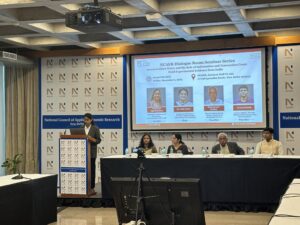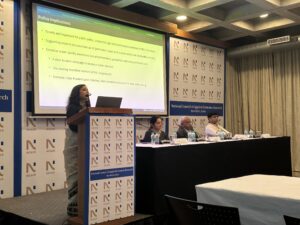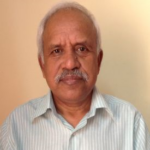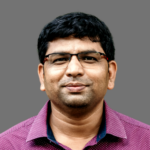 NCAER organised an in-person event on Access to Clean Water and the Role of Information and Transaction Costs on 1 December 2023, as part of its Dialogue Room Seminar Series. Details of the paper Abstract and the panellists at the seminar are given below
NCAER organised an in-person event on Access to Clean Water and the Role of Information and Transaction Costs on 1 December 2023, as part of its Dialogue Room Seminar Series. Details of the paper Abstract and the panellists at the seminar are given below
Abstract
In a rural region of India where groundwater is heavily contaminated with a hazardous naturally occurring compound, the authors of this paper worked with State government agencies to implement a cluster RCT to study the reasons behind the lack of demand for water quality in the region. They studied the constraints that households with young children and pregnant mothers face in accessing clean water: is it the lack of information on water quality (Treatment 1) or is it a combination of information and the transaction costs associated with applying for water via a government private tap water connection programme (Treatment 2)? The results indicate that the information campaign alone was sufficient to successfully increase awareness and knowledge of arsenic and its ill-effects as well as awareness of alternate water supply schemes implemented by the state government. However, the transaction cost treatment was salient for translating this enhanced awareness into actual change in behaviour and outcomes related to water safety. In particular, the authors find large effects on demand for improved water quality and adoption of water safety practices. Most notably, the transaction cost treatment led to an increase in breastfeeding (planned) durations among (pregnant) mothers.
Presenter:
 Prarthna Agarwal Goel is Assistant Professor with the Department of Economics at Guru Gobind Singh Indraprastha University. She completed her PhD and MPhil from Jawaharlal Nehru University. She has a Master’s in Economics from Delhi School of Economics and a Bachelor’s in Economics from Hansraj College, Delhi University. She has a teaching experience of more than 12 years at Delhi University and Guru Gobind Singh Indraprastha University. Prior to joining the academic sector, she worked with the analytics industry for seven years. During her tenure with the corporate industry, she worked extensively on credit risk modelling and marketing mix analytics. Her areas of interest include gender studies, environment, and development economics. She has published in high-ranking journals and is on the editorial board of reputed economics journals. She has worked on nationally and internationally funded research projects, and also holds a patent on ‘Marketing Investment Optimizer with Dynamic Hierarchies’ in the USA, Australia, and China.
Prarthna Agarwal Goel is Assistant Professor with the Department of Economics at Guru Gobind Singh Indraprastha University. She completed her PhD and MPhil from Jawaharlal Nehru University. She has a Master’s in Economics from Delhi School of Economics and a Bachelor’s in Economics from Hansraj College, Delhi University. She has a teaching experience of more than 12 years at Delhi University and Guru Gobind Singh Indraprastha University. Prior to joining the academic sector, she worked with the analytics industry for seven years. During her tenure with the corporate industry, she worked extensively on credit risk modelling and marketing mix analytics. Her areas of interest include gender studies, environment, and development economics. She has published in high-ranking journals and is on the editorial board of reputed economics journals. She has worked on nationally and internationally funded research projects, and also holds a patent on ‘Marketing Investment Optimizer with Dynamic Hierarchies’ in the USA, Australia, and China.
Chair:
 Sonalde Desai is a Distinguished University Professor, at the Department of Sociology, University of Maryland, and Professor and Centre Director at the NCAER-National Data Innovation Centre, New Delhi. She is a demographer whose work deals primarily with social transformation and its impact on the lives of individuals with a focus on education, employment, gender, and maternal and child health. She leads the India Human Development Survey (IHDS) of over 40,000 households, one of the few national panel surveys in India that provides a rich and free public resource for studying the transformation of the Indian society in the twenty-first century between 2004 and 2023. She has published extensively in Indian and international journals and served on editorial boards of several major journals. She is a frequent contributor to Indian English language newspapers. She received a PhD from Stanford University and post-doctoral training at the University of Chicago and RAND Corporation. She was elected President of Population Association of America for 2022 and has been named a Fellow of American Association for the Advancement of Science (AAAS). She also serves on several government committees in India, such as the Standing Committee on Statistics, (Ministry of Statistics and Programme Implementation), the Task Force on Indian Statistical System (NITI Aayog), and Technical Advisory Committee on Surveys (RBI).
Sonalde Desai is a Distinguished University Professor, at the Department of Sociology, University of Maryland, and Professor and Centre Director at the NCAER-National Data Innovation Centre, New Delhi. She is a demographer whose work deals primarily with social transformation and its impact on the lives of individuals with a focus on education, employment, gender, and maternal and child health. She leads the India Human Development Survey (IHDS) of over 40,000 households, one of the few national panel surveys in India that provides a rich and free public resource for studying the transformation of the Indian society in the twenty-first century between 2004 and 2023. She has published extensively in Indian and international journals and served on editorial boards of several major journals. She is a frequent contributor to Indian English language newspapers. She received a PhD from Stanford University and post-doctoral training at the University of Chicago and RAND Corporation. She was elected President of Population Association of America for 2022 and has been named a Fellow of American Association for the Advancement of Science (AAAS). She also serves on several government committees in India, such as the Standing Committee on Statistics, (Ministry of Statistics and Programme Implementation), the Task Force on Indian Statistical System (NITI Aayog), and Technical Advisory Committee on Surveys (RBI).
Distinguished Panellists:
 Bishwanath Goldar is a Retired Professor of Economics of the Institute of Economic Growth (IEG), Delhi. He has an MA and PhD in Economics from Delhi School of Economics, University of Delhi. He served at the Institute of Economic Growth (IEG) from 1979 to 2014, except for three brief stints at a professorial or equivalent position at the National Institute of Public Finance and Policy (1988-90), the Indian Council for Research on International Economic Relations (2003-04), and the Jawaharlal Nehru University (2012-13). During 2015-2016, he was a National Fellow of the Indian Council of Social Science Research , affiliated with IEG. He is a former member of the National Statistical Commission. He is currently a Non-resident Senior Fellow at the IEG.
Bishwanath Goldar is a Retired Professor of Economics of the Institute of Economic Growth (IEG), Delhi. He has an MA and PhD in Economics from Delhi School of Economics, University of Delhi. He served at the Institute of Economic Growth (IEG) from 1979 to 2014, except for three brief stints at a professorial or equivalent position at the National Institute of Public Finance and Policy (1988-90), the Indian Council for Research on International Economic Relations (2003-04), and the Jawaharlal Nehru University (2012-13). During 2015-2016, he was a National Fellow of the Indian Council of Social Science Research , affiliated with IEG. He is a former member of the National Statistical Commission. He is currently a Non-resident Senior Fellow at the IEG.
 Debasis Barik is a Senior Fellow at the NCAER-National Data Innovation Centre (NDIC). His primary research areas include public health and mortality, migration, gender, healthcare financing, and environmental health. He is a demographer by training and has for long been associated with survey design and survey implementation. He is an active member of various national and international organisations, working in areas of demography and social sciences. Since 2017, he has been a member of the Expert Group formed by the National Health System Resource Centre to institutionalise National Health Accounts estimates. He is also serving as Associate Editor and Review Editor for some reputed international journals. He has a PhD in Population Studies from the International Institute for Population Sciences, Mumbai.
Debasis Barik is a Senior Fellow at the NCAER-National Data Innovation Centre (NDIC). His primary research areas include public health and mortality, migration, gender, healthcare financing, and environmental health. He is a demographer by training and has for long been associated with survey design and survey implementation. He is an active member of various national and international organisations, working in areas of demography and social sciences. Since 2017, he has been a member of the Expert Group formed by the National Health System Resource Centre to institutionalise National Health Accounts estimates. He is also serving as Associate Editor and Review Editor for some reputed international journals. He has a PhD in Population Studies from the International Institute for Population Sciences, Mumbai.







 Prarthna Agarwal Goel is Assistant Professor with the Department of Economics at Guru Gobind Singh Indraprastha University. She completed her PhD and MPhil from Jawaharlal Nehru University. She has a Master’s in Economics from Delhi School of Economics and a Bachelor’s in Economics from Hansraj College, Delhi University. She has a teaching experience of more than 12 years at Delhi University and Guru Gobind Singh Indraprastha University. Prior to joining the academic sector, she worked with the analytics industry for seven years. During her tenure with the corporate industry, she worked extensively on credit risk modelling and marketing mix analytics. Her areas of interest include gender studies, environment, and development economics. She has published in high-ranking journals and is on the editorial board of reputed economics journals. She has worked on nationally and internationally funded research projects, and also holds a patent on ‘Marketing Investment Optimizer with Dynamic Hierarchies’ in the USA, Australia, and China.
Prarthna Agarwal Goel is Assistant Professor with the Department of Economics at Guru Gobind Singh Indraprastha University. She completed her PhD and MPhil from Jawaharlal Nehru University. She has a Master’s in Economics from Delhi School of Economics and a Bachelor’s in Economics from Hansraj College, Delhi University. She has a teaching experience of more than 12 years at Delhi University and Guru Gobind Singh Indraprastha University. Prior to joining the academic sector, she worked with the analytics industry for seven years. During her tenure with the corporate industry, she worked extensively on credit risk modelling and marketing mix analytics. Her areas of interest include gender studies, environment, and development economics. She has published in high-ranking journals and is on the editorial board of reputed economics journals. She has worked on nationally and internationally funded research projects, and also holds a patent on ‘Marketing Investment Optimizer with Dynamic Hierarchies’ in the USA, Australia, and China. Sonalde Desai is a Distinguished University Professor, at the Department of Sociology, University of Maryland, and Professor and Centre Director at the NCAER-National Data Innovation Centre, New Delhi. She is a demographer whose work deals primarily with social transformation and its impact on the lives of individuals with a focus on education, employment, gender, and maternal and child health. She leads the India Human Development Survey (IHDS) of over 40,000 households, one of the few national panel surveys in India that provides a rich and free public resource for studying the transformation of the Indian society in the twenty-first century between 2004 and 2023. She has published extensively in Indian and international journals and served on editorial boards of several major journals. She is a frequent contributor to Indian English language newspapers. She received a PhD from Stanford University and post-doctoral training at the University of Chicago and RAND Corporation. She was elected President of Population Association of America for 2022 and has been named a Fellow of American Association for the Advancement of Science (AAAS). She also serves on several government committees in India, such as the Standing Committee on Statistics, (Ministry of Statistics and Programme Implementation), the Task Force on Indian Statistical System (NITI Aayog), and Technical Advisory Committee on Surveys (RBI).
Sonalde Desai is a Distinguished University Professor, at the Department of Sociology, University of Maryland, and Professor and Centre Director at the NCAER-National Data Innovation Centre, New Delhi. She is a demographer whose work deals primarily with social transformation and its impact on the lives of individuals with a focus on education, employment, gender, and maternal and child health. She leads the India Human Development Survey (IHDS) of over 40,000 households, one of the few national panel surveys in India that provides a rich and free public resource for studying the transformation of the Indian society in the twenty-first century between 2004 and 2023. She has published extensively in Indian and international journals and served on editorial boards of several major journals. She is a frequent contributor to Indian English language newspapers. She received a PhD from Stanford University and post-doctoral training at the University of Chicago and RAND Corporation. She was elected President of Population Association of America for 2022 and has been named a Fellow of American Association for the Advancement of Science (AAAS). She also serves on several government committees in India, such as the Standing Committee on Statistics, (Ministry of Statistics and Programme Implementation), the Task Force on Indian Statistical System (NITI Aayog), and Technical Advisory Committee on Surveys (RBI). Bishwanath Goldar is a Retired Professor of Economics of the Institute of Economic Growth (IEG), Delhi. He has an MA and PhD in Economics from Delhi School of Economics, University of Delhi. He served at the Institute of Economic Growth (IEG) from 1979 to 2014, except for three brief stints at a professorial or equivalent position at the National Institute of Public Finance and Policy (1988-90), the Indian Council for Research on International Economic Relations (2003-04), and the Jawaharlal Nehru University (2012-13). During 2015-2016, he was a National Fellow of the Indian Council of Social Science Research , affiliated with IEG. He is a former member of the National Statistical Commission. He is currently a Non-resident Senior Fellow at the IEG.
Bishwanath Goldar is a Retired Professor of Economics of the Institute of Economic Growth (IEG), Delhi. He has an MA and PhD in Economics from Delhi School of Economics, University of Delhi. He served at the Institute of Economic Growth (IEG) from 1979 to 2014, except for three brief stints at a professorial or equivalent position at the National Institute of Public Finance and Policy (1988-90), the Indian Council for Research on International Economic Relations (2003-04), and the Jawaharlal Nehru University (2012-13). During 2015-2016, he was a National Fellow of the Indian Council of Social Science Research , affiliated with IEG. He is a former member of the National Statistical Commission. He is currently a Non-resident Senior Fellow at the IEG. Debasis Barik is a Senior Fellow at the NCAER-National Data Innovation Centre (NDIC). His primary research areas include public health and mortality, migration, gender, healthcare financing, and environmental health. He is a demographer by training and has for long been associated with survey design and survey implementation. He is an active member of various national and international organisations, working in areas of demography and social sciences. Since 2017, he has been a member of the Expert Group formed by the National Health System Resource Centre to institutionalise National Health Accounts estimates. He is also serving as Associate Editor and Review Editor for some reputed international journals. He has a PhD in Population Studies from the International Institute for Population Sciences, Mumbai.
Debasis Barik is a Senior Fellow at the NCAER-National Data Innovation Centre (NDIC). His primary research areas include public health and mortality, migration, gender, healthcare financing, and environmental health. He is a demographer by training and has for long been associated with survey design and survey implementation. He is an active member of various national and international organisations, working in areas of demography and social sciences. Since 2017, he has been a member of the Expert Group formed by the National Health System Resource Centre to institutionalise National Health Accounts estimates. He is also serving as Associate Editor and Review Editor for some reputed international journals. He has a PhD in Population Studies from the International Institute for Population Sciences, Mumbai.